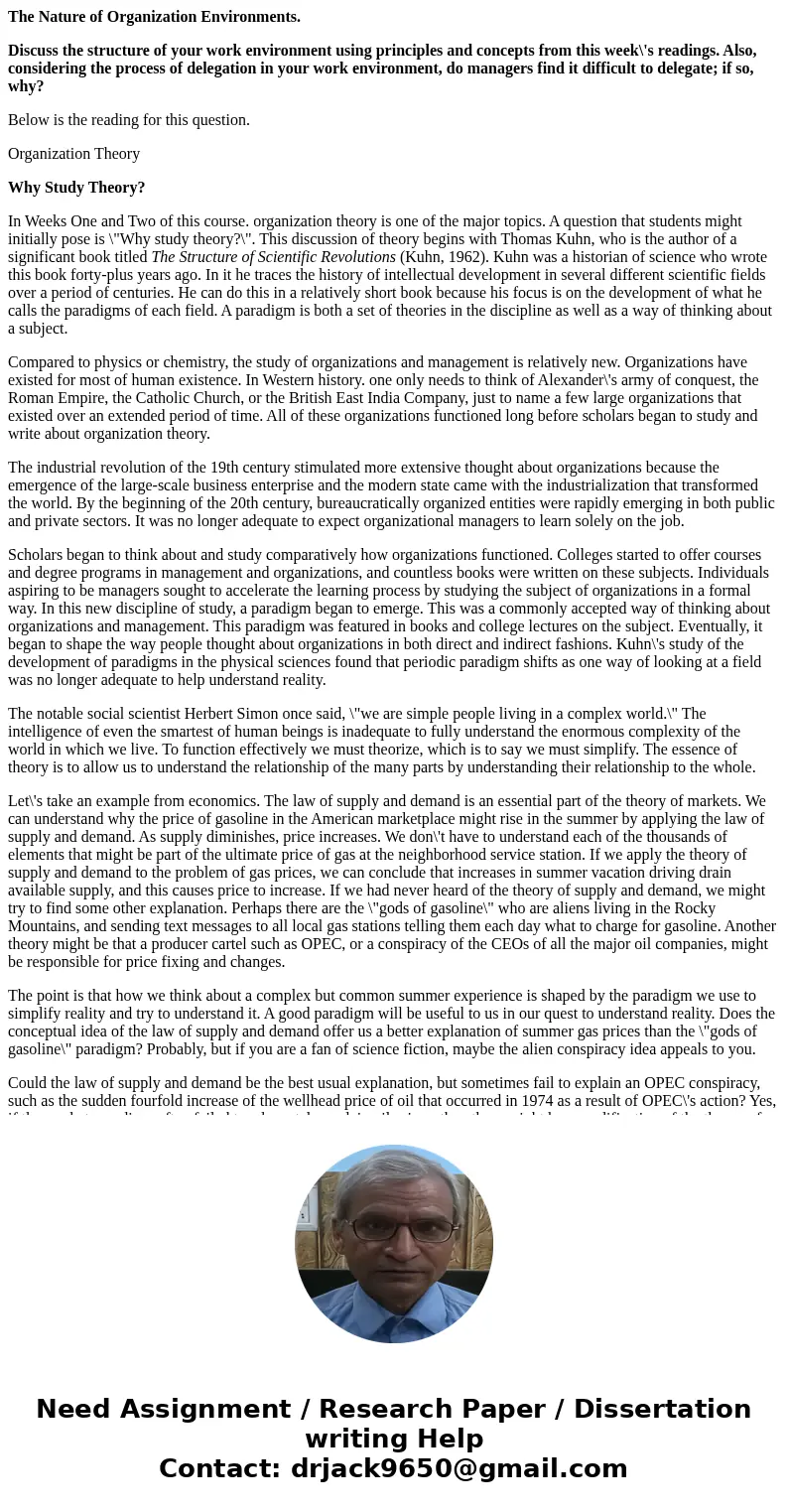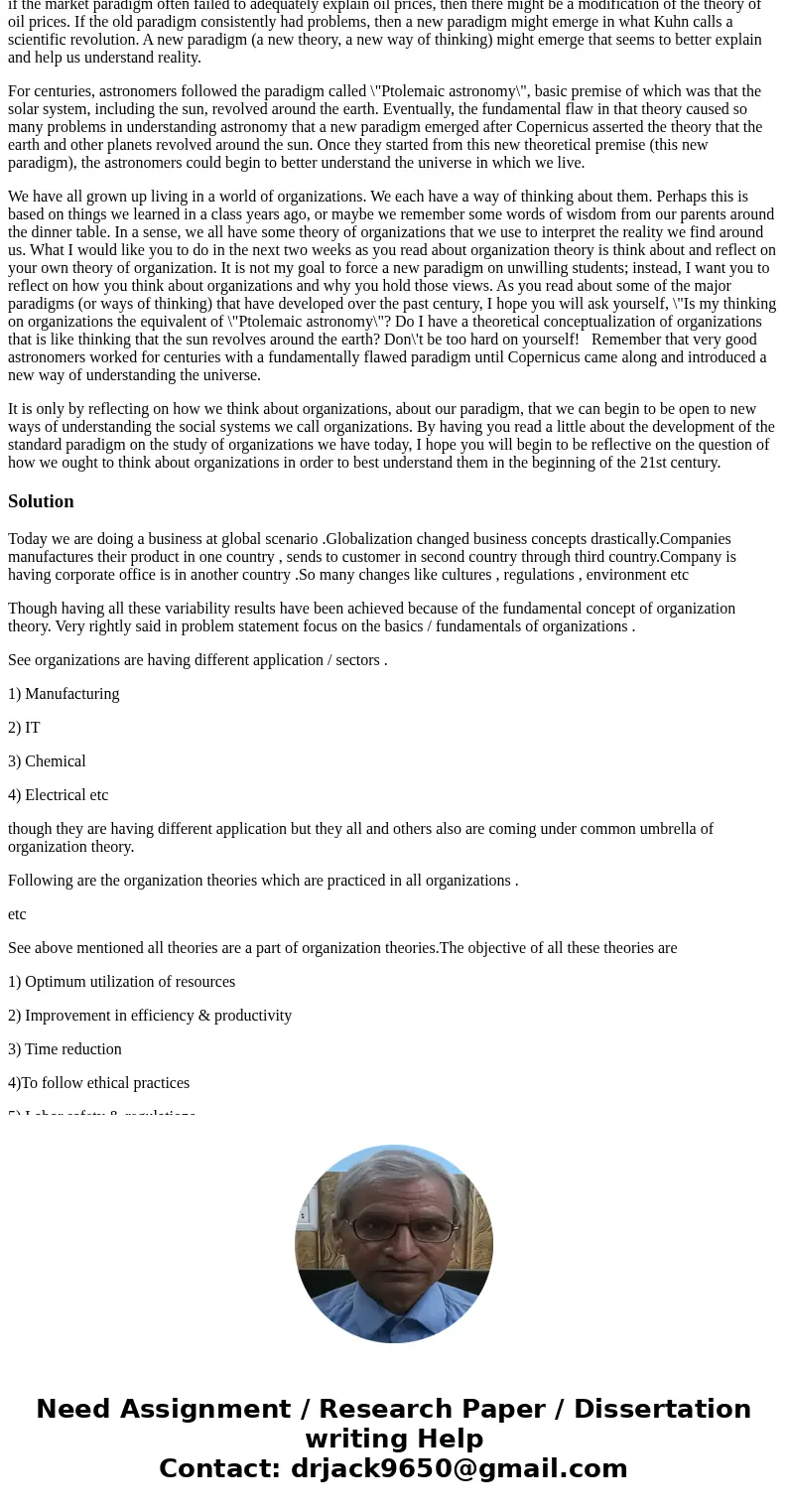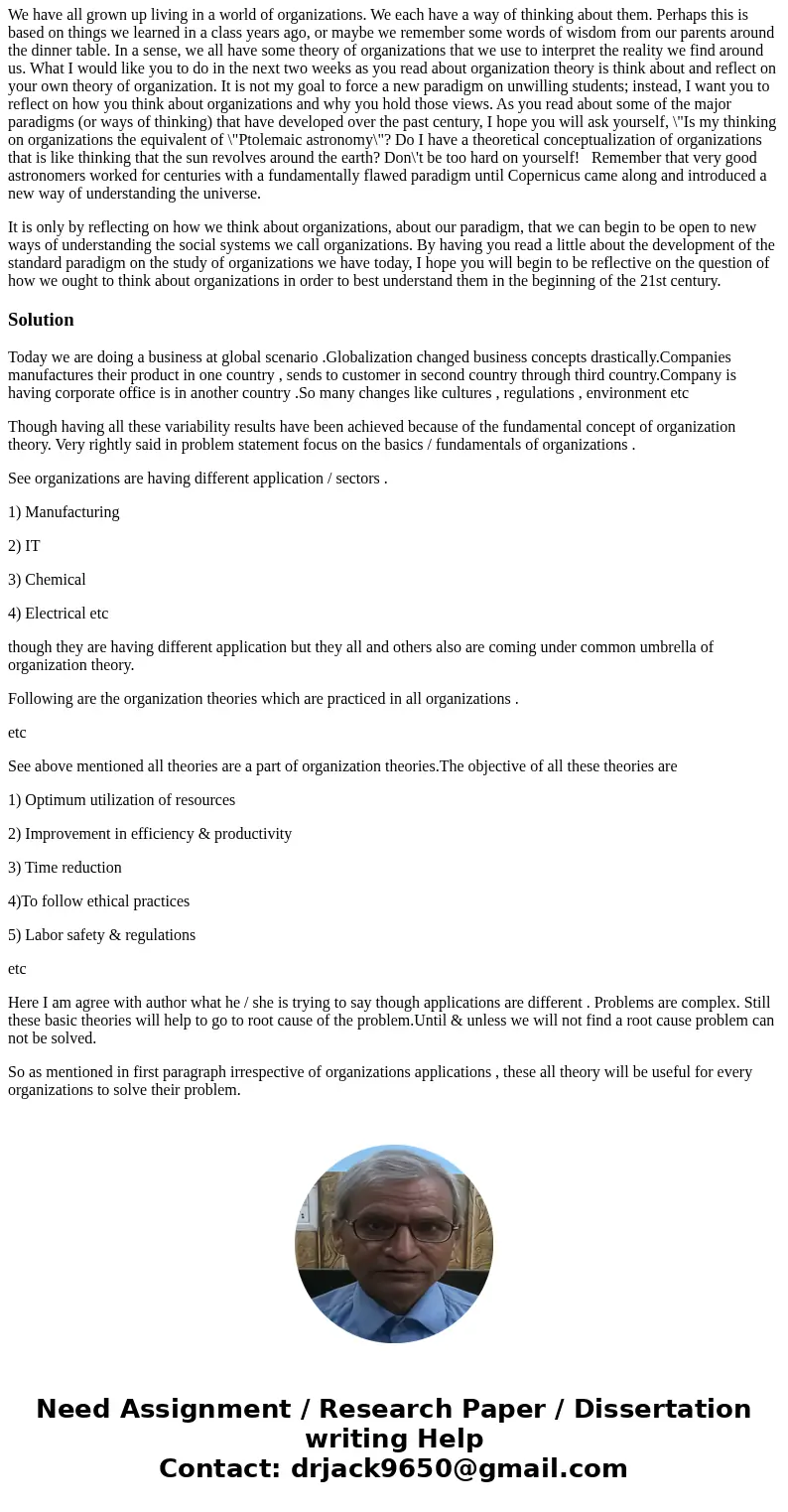The Nature of Organization Environments Discuss the structur
The Nature of Organization Environments.
Discuss the structure of your work environment using principles and concepts from this week\'s readings. Also, considering the process of delegation in your work environment, do managers find it difficult to delegate; if so, why?
Below is the reading for this question.
Organization Theory
Why Study Theory?
In Weeks One and Two of this course. organization theory is one of the major topics. A question that students might initially pose is \"Why study theory?\". This discussion of theory begins with Thomas Kuhn, who is the author of a significant book titled The Structure of Scientific Revolutions (Kuhn, 1962). Kuhn was a historian of science who wrote this book forty-plus years ago. In it he traces the history of intellectual development in several different scientific fields over a period of centuries. He can do this in a relatively short book because his focus is on the development of what he calls the paradigms of each field. A paradigm is both a set of theories in the discipline as well as a way of thinking about a subject.
Compared to physics or chemistry, the study of organizations and management is relatively new. Organizations have existed for most of human existence. In Western history. one only needs to think of Alexander\'s army of conquest, the Roman Empire, the Catholic Church, or the British East India Company, just to name a few large organizations that existed over an extended period of time. All of these organizations functioned long before scholars began to study and write about organization theory.
The industrial revolution of the 19th century stimulated more extensive thought about organizations because the emergence of the large-scale business enterprise and the modern state came with the industrialization that transformed the world. By the beginning of the 20th century, bureaucratically organized entities were rapidly emerging in both public and private sectors. It was no longer adequate to expect organizational managers to learn solely on the job.
Scholars began to think about and study comparatively how organizations functioned. Colleges started to offer courses and degree programs in management and organizations, and countless books were written on these subjects. Individuals aspiring to be managers sought to accelerate the learning process by studying the subject of organizations in a formal way. In this new discipline of study, a paradigm began to emerge. This was a commonly accepted way of thinking about organizations and management. This paradigm was featured in books and college lectures on the subject. Eventually, it began to shape the way people thought about organizations in both direct and indirect fashions. Kuhn\'s study of the development of paradigms in the physical sciences found that periodic paradigm shifts as one way of looking at a field was no longer adequate to help understand reality.
The notable social scientist Herbert Simon once said, \"we are simple people living in a complex world.\" The intelligence of even the smartest of human beings is inadequate to fully understand the enormous complexity of the world in which we live. To function effectively we must theorize, which is to say we must simplify. The essence of theory is to allow us to understand the relationship of the many parts by understanding their relationship to the whole.
Let\'s take an example from economics. The law of supply and demand is an essential part of the theory of markets. We can understand why the price of gasoline in the American marketplace might rise in the summer by applying the law of supply and demand. As supply diminishes, price increases. We don\'t have to understand each of the thousands of elements that might be part of the ultimate price of gas at the neighborhood service station. If we apply the theory of supply and demand to the problem of gas prices, we can conclude that increases in summer vacation driving drain available supply, and this causes price to increase. If we had never heard of the theory of supply and demand, we might try to find some other explanation. Perhaps there are the \"gods of gasoline\" who are aliens living in the Rocky Mountains, and sending text messages to all local gas stations telling them each day what to charge for gasoline. Another theory might be that a producer cartel such as OPEC, or a conspiracy of the CEOs of all the major oil companies, might be responsible for price fixing and changes.
The point is that how we think about a complex but common summer experience is shaped by the paradigm we use to simplify reality and try to understand it. A good paradigm will be useful to us in our quest to understand reality. Does the conceptual idea of the law of supply and demand offer us a better explanation of summer gas prices than the \"gods of gasoline\" paradigm? Probably, but if you are a fan of science fiction, maybe the alien conspiracy idea appeals to you.
Could the law of supply and demand be the best usual explanation, but sometimes fail to explain an OPEC conspiracy, such as the sudden fourfold increase of the wellhead price of oil that occurred in 1974 as a result of OPEC\'s action? Yes, if the market paradigm often failed to adequately explain oil prices, then there might be a modification of the theory of oil prices. If the old paradigm consistently had problems, then a new paradigm might emerge in what Kuhn calls a scientific revolution. A new paradigm (a new theory, a new way of thinking) might emerge that seems to better explain and help us understand reality.
For centuries, astronomers followed the paradigm called \"Ptolemaic astronomy\", basic premise of which was that the solar system, including the sun, revolved around the earth. Eventually, the fundamental flaw in that theory caused so many problems in understanding astronomy that a new paradigm emerged after Copernicus asserted the theory that the earth and other planets revolved around the sun. Once they started from this new theoretical premise (this new paradigm), the astronomers could begin to better understand the universe in which we live.
We have all grown up living in a world of organizations. We each have a way of thinking about them. Perhaps this is based on things we learned in a class years ago, or maybe we remember some words of wisdom from our parents around the dinner table. In a sense, we all have some theory of organizations that we use to interpret the reality we find around us. What I would like you to do in the next two weeks as you read about organization theory is think about and reflect on your own theory of organization. It is not my goal to force a new paradigm on unwilling students; instead, I want you to reflect on how you think about organizations and why you hold those views. As you read about some of the major paradigms (or ways of thinking) that have developed over the past century, I hope you will ask yourself, \"Is my thinking on organizations the equivalent of \"Ptolemaic astronomy\"? Do I have a theoretical conceptualization of organizations that is like thinking that the sun revolves around the earth? Don\'t be too hard on yourself! Remember that very good astronomers worked for centuries with a fundamentally flawed paradigm until Copernicus came along and introduced a new way of understanding the universe.
It is only by reflecting on how we think about organizations, about our paradigm, that we can begin to be open to new ways of understanding the social systems we call organizations. By having you read a little about the development of the standard paradigm on the study of organizations we have today, I hope you will begin to be reflective on the question of how we ought to think about organizations in order to best understand them in the beginning of the 21st century.
Solution
Today we are doing a business at global scenario .Globalization changed business concepts drastically.Companies manufactures their product in one country , sends to customer in second country through third country.Company is having corporate office is in another country .So many changes like cultures , regulations , environment etc
Though having all these variability results have been achieved because of the fundamental concept of organization theory. Very rightly said in problem statement focus on the basics / fundamentals of organizations .
See organizations are having different application / sectors .
1) Manufacturing
2) IT
3) Chemical
4) Electrical etc
though they are having different application but they all and others also are coming under common umbrella of organization theory.
Following are the organization theories which are practiced in all organizations .
etc
See above mentioned all theories are a part of organization theories.The objective of all these theories are
1) Optimum utilization of resources
2) Improvement in efficiency & productivity
3) Time reduction
4)To follow ethical practices
5) Labor safety & regulations
etc
Here I am agree with author what he / she is trying to say though applications are different . Problems are complex. Still these basic theories will help to go to root cause of the problem.Until & unless we will not find a root cause problem can not be solved.
So as mentioned in first paragraph irrespective of organizations applications , these all theory will be useful for every organizations to solve their problem.



 Homework Sourse
Homework Sourse